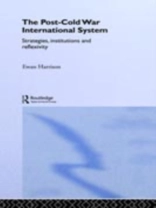The end of the Cold War has opened up a ‘real world laboratory’ in which to test and refine general theories of international relations. Using the frameworks provided by structural realism, institutionalism and liberalism, The Post-Cold War International System examines how major powers responded to the collapse of the Soviet Union and developed their foreign policies over the period of post-Cold War transition. The book argues that the democratic peace has begun to generate powerful socialisation effects, due to the emergence of a critical mass of liberal democratic states since the end of the Cold War. The trend this has produced is similar to a pattern that classical realists have interpreted as ‘bandwagoning’ within a unipolar power structure. Case studies of Germany, China and Japan – identified as key states with the potential to challenge US dominance – provide evidence to support the assessment of international change. The author concludes by exploring the implications of September 11th for the analysis developed. This important volume argues that the end of the Cold War was a major historical turning point in the development of world politics with fundamental implications for the basic way in which the dynamics of the international system are conceptualised.
Ewan Harrison
Post-Cold War International System [PDF ebook]
Strategies, Institutions and Reflexivity
Post-Cold War International System [PDF ebook]
Strategies, Institutions and Reflexivity
Buy this ebook and get 1 more FREE!
Language English ● Format PDF ● Pages 200 ● ISBN 9780203366233 ● Publisher Taylor and Francis ● Published 2004 ● Downloadable 6 times ● Currency EUR ● ID 2289670 ● Copy protection Adobe DRM
Requires a DRM capable ebook reader












